Cooking Sections: visualising a responsible food industry
Turner Prize-nominated Cooking Sections explore how we can create and consume food more sustainably. Priya Khanchandani, head of curatorial at London’s Design Museum, talks to founders Daniel Fernández Pascual and Alon Schwabe about the politics of food, and fixing broken structures of consumption.
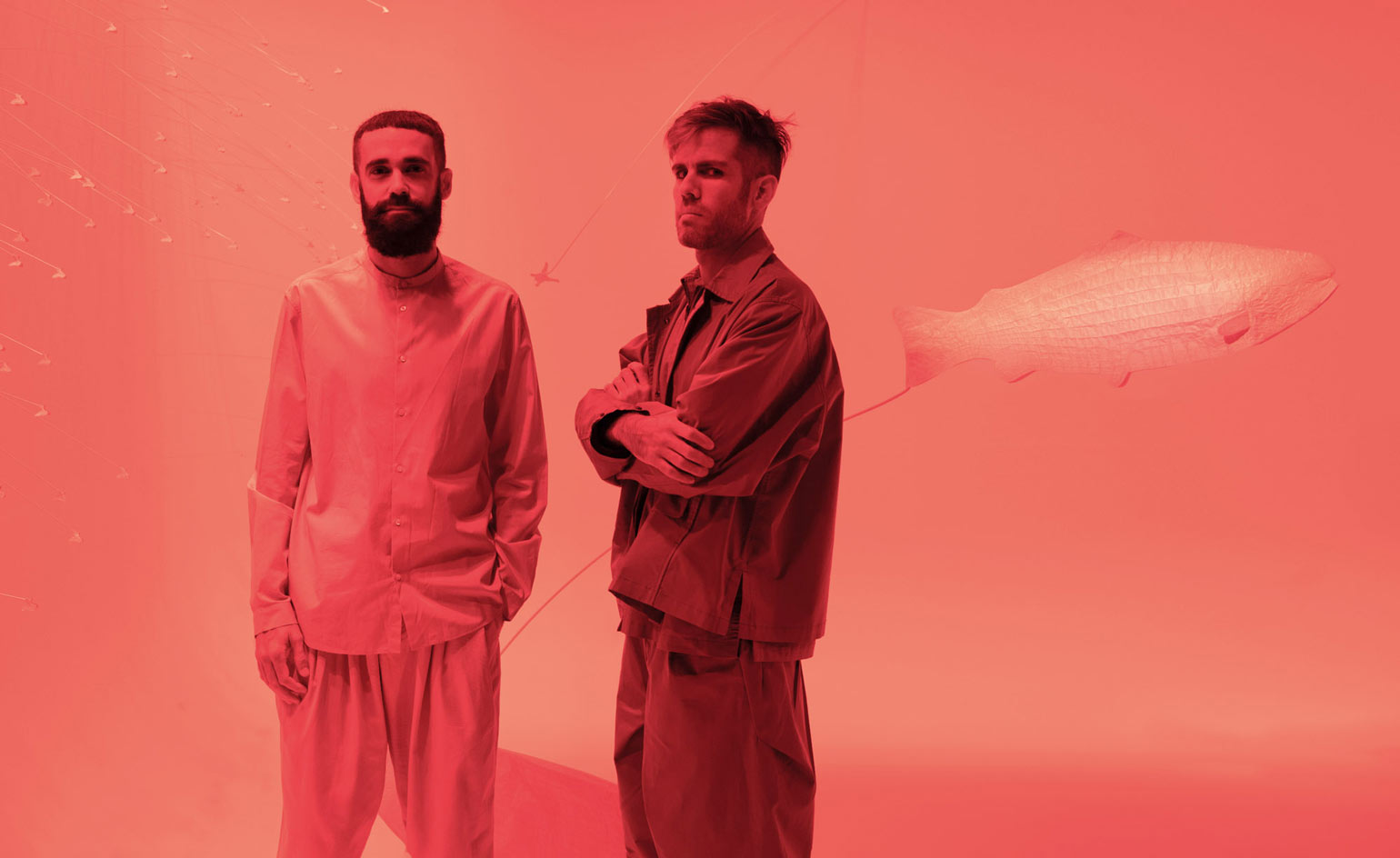
Receive our daily digest of inspiration, escapism and design stories from around the world direct to your inbox.
You are now subscribed
Your newsletter sign-up was successful
Want to add more newsletters?

Daily (Mon-Sun)
Daily Digest
Sign up for global news and reviews, a Wallpaper* take on architecture, design, art & culture, fashion & beauty, travel, tech, watches & jewellery and more.

Monthly, coming soon
The Rundown
A design-minded take on the world of style from Wallpaper* fashion features editor Jack Moss, from global runway shows to insider news and emerging trends.

Monthly, coming soon
The Design File
A closer look at the people and places shaping design, from inspiring interiors to exceptional products, in an expert edit by Wallpaper* global design director Hugo Macdonald.
On a bright white stage in a black room at Tate Britain, the frail, white silhouettes of creatures – a penguin, a flamingo, a dog, a shrimp and a fish – fade eerily into the backdrop, accompanied by the quiet, expectant gargle of water. It’s a haunting sight, devoid of colour, movement or life, frozen in a desolate seascape.
As we reflect on how it came to this, a voice begins to speak. Its script reveals that this scene is a metaphorical representation of the exploitation of salmon through industrial farming in Scotland. Farmed salmon – which are denied a natural diet of krill and shrimp – are deprived of astaxanthin, which gives their flesh its pink or reddish colour and protects them from solar radiation and stress.
They are genetically modified, subjected to year-round summer-like atmospheres so they grow faster, and often suffer from physical deformities and parasites. We are told that ‘salmon is the colour of a wild fish which is neither wild, nor fish, nor even salmon’.
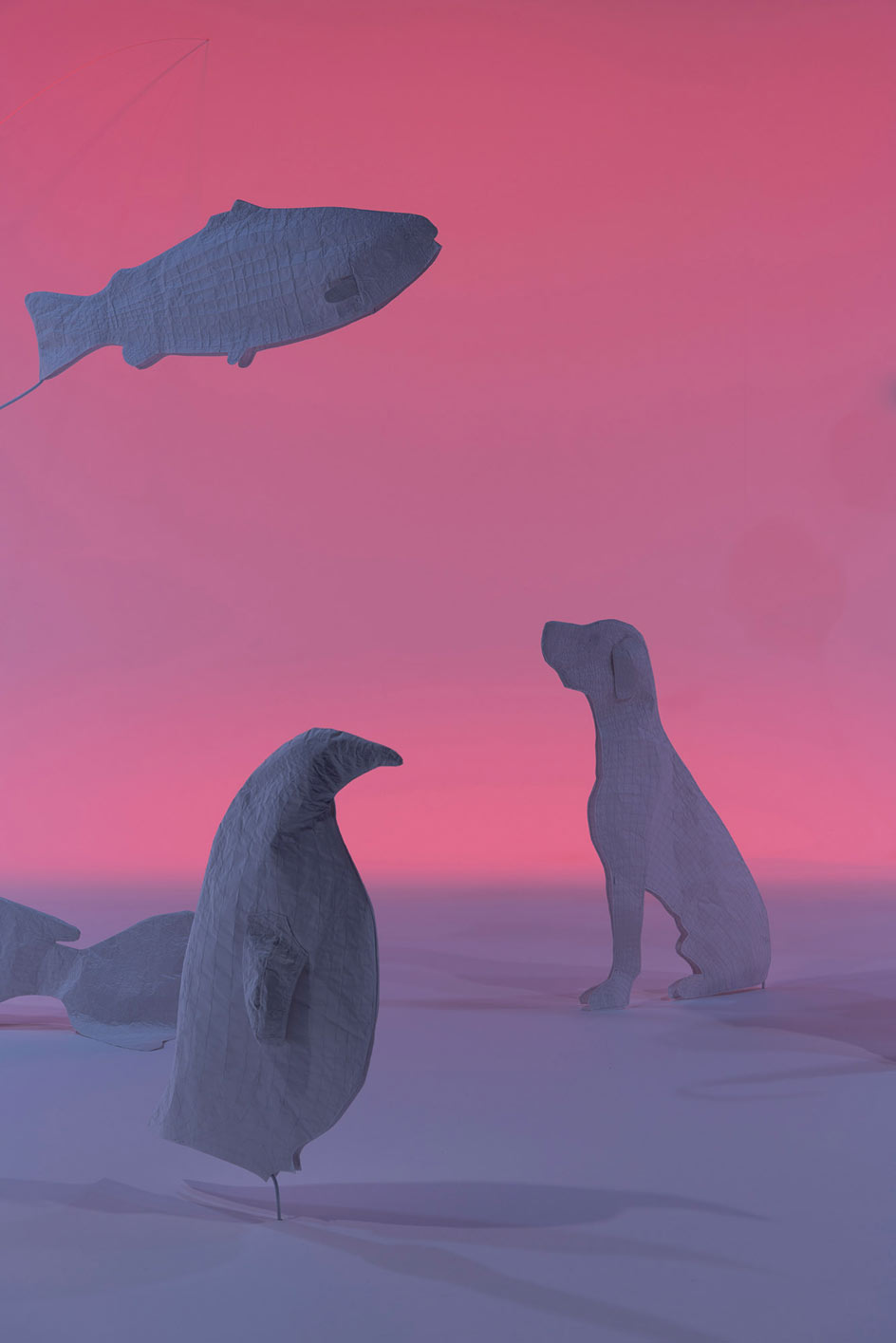
The site-specific installation ‘Salmon: A Red Herring’ by Cooking Sections, currently showing at Tate Britain, questions what colours we expect in our ‘natural’ environment. © Tate
Fusing design, art, activism and community work, the founders of Cooking Sections, Daniel Fernández Pascual and Alon Schwabe, explore how and what we eat, as well as ways in which we can do so more sustainably in the interests of wildlife, our own health and the ecosystems we inhabit. Their solo exhibition at Tate Britain, titled ‘Salmon: A Red Herring’, ‘is a continuation of the project we’ve been doing in Skye in Scotland for the past five years’, says Pascual. ‘We started looking at the impact of salmon farms across the island, and creating a structure to rethink agricultures, but also to start transitioning from salmon farming to other ways of eating.’
In 2017, Schwabe and Pascual launched a public installation on an intertidal zone just outside Portree, on the Isle of Skye, consisting of an underwater oyster table that turns into a community dining space at low tide. Here, they invited politicians, residents, activists and environmentalists to come together and rethink the way salmon is farmed. They also persuaded a network of local restaurants to remove farmed salmon from the menu, and introduce more sustainable alternatives from a diet they term Climavore, which is rich in ingredients such as oysters, mussels and seaweeds (selected for their environmental properties – the ability to purify polluted or acidified waters, or resistance to drought). For their project with Tate Britain, they persuaded the gallery to remove farmed salmon from menus at all of its venues and substitute it for Climavore dishes, such as pasta salad with seaweed pesto and nettle soup with buckwheat.
As featured in the August 2021 issue of Wallpaper*, on newsstands and available for free download
At Tate Britain, the white seascape fills with coloured lights, ‘the 15 Pantones of salmon’, indicating the juicy pinks of Britain’s farmed fish are about as natural as synthetic paint
The installation takes us to what Schwabe describes as ‘a colour sphere that we are passing through, or that is passing through us’. The white seascape fills with coloured lights, described potently as ‘the 15 Pantones of salmon’, indicating that the juicy pinks of Britain’s farmed fish are about as natural as synthetic paint. To replicate the colouring effects of astaxanthin, they are fed engineered fish food that contains similar pigments. The flashing lights, in shades of salmon ranging from oranges to reds, alert us to the state of a food industry in which animals are commoditised and injected with chemicals, which we then consume.
Schwabe and Pascual started working together in 2013, having met while studying architecture at Goldsmiths. As Cooking Sections, they are preoccupied with the politics of food and the environment. They began to focus on salmon farming in 2016, initially as community activists and researchers in Scotland. Since then, they have experimented with sustainable agriculture through numerous interventions, including a drought-resistant garden shown at the Sharjah Architecture Triennial in 2019.
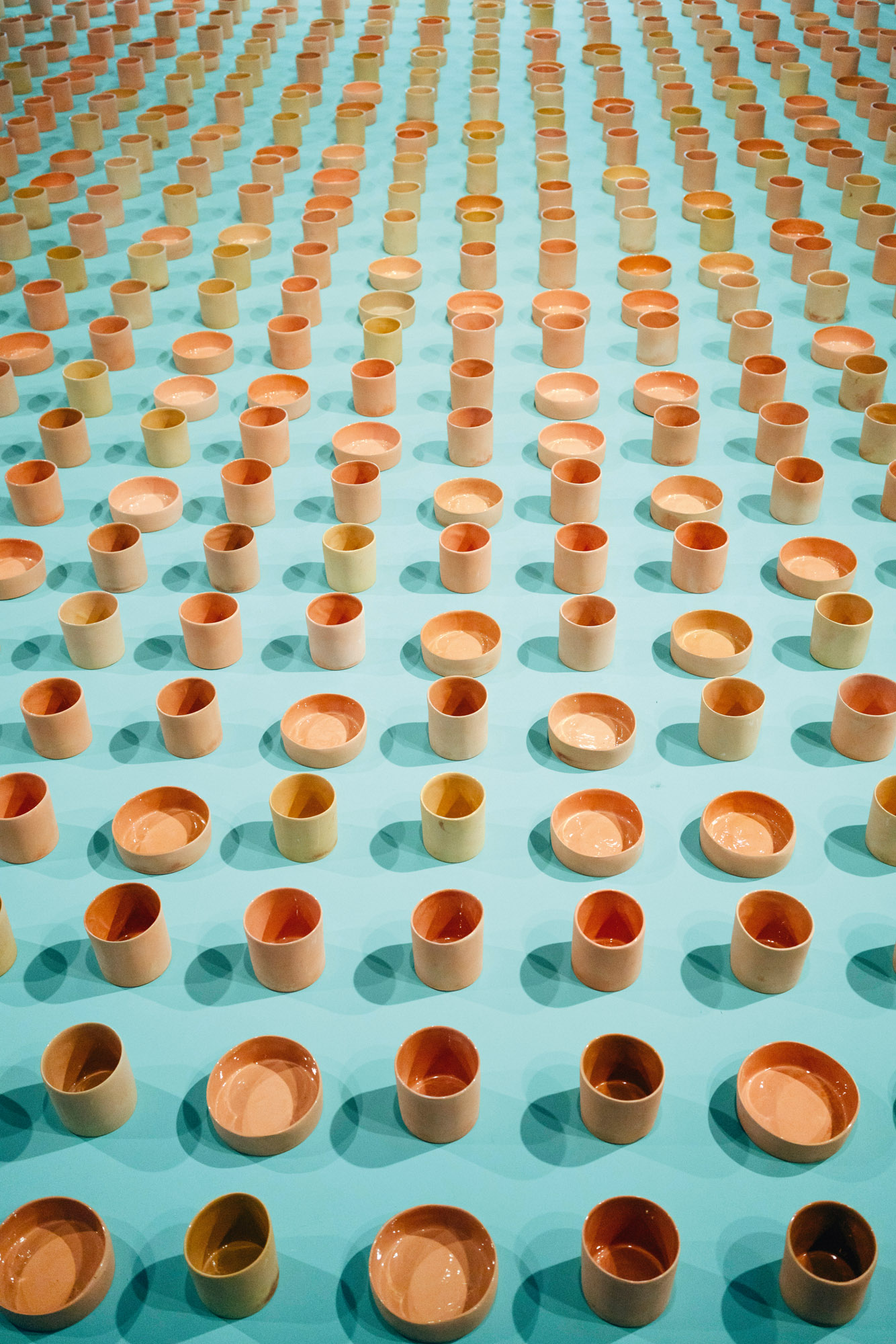
Climavore: Seasons Made to Drift’, showing at Salt Beyoglu in Istanbul, features five commissioned works, and explores the impact of environmental and climatic changes on our diet.
They are aware that in order to change the way we consume and produce food, their work will need to straddle different spheres. Some of their most effective work is in communities, such as an apprenticeship programme they set up in Skye to train the next generation of cooks. ‘We are very concerned with education and growing food, as much as we are concerned with engaging with cultural institutions,’ explains Pascual. ‘But one is no more important than the other. That is something we spend a lot of time thinking about: how do you bring all of these different spaces together that could be seen as very discrete or separate from each other?’
Cooking Sections has recently been nominated for the Turner Prize, which this year honours five art collectives that have worked with communities to inspire social change through art. In doing so, the prize has taken under its wing practices that may not self-identify as ‘artists’. Architects by training, Cooking Sections has exhibited in design and architecture forums, visual art institutions and also in public spaces.
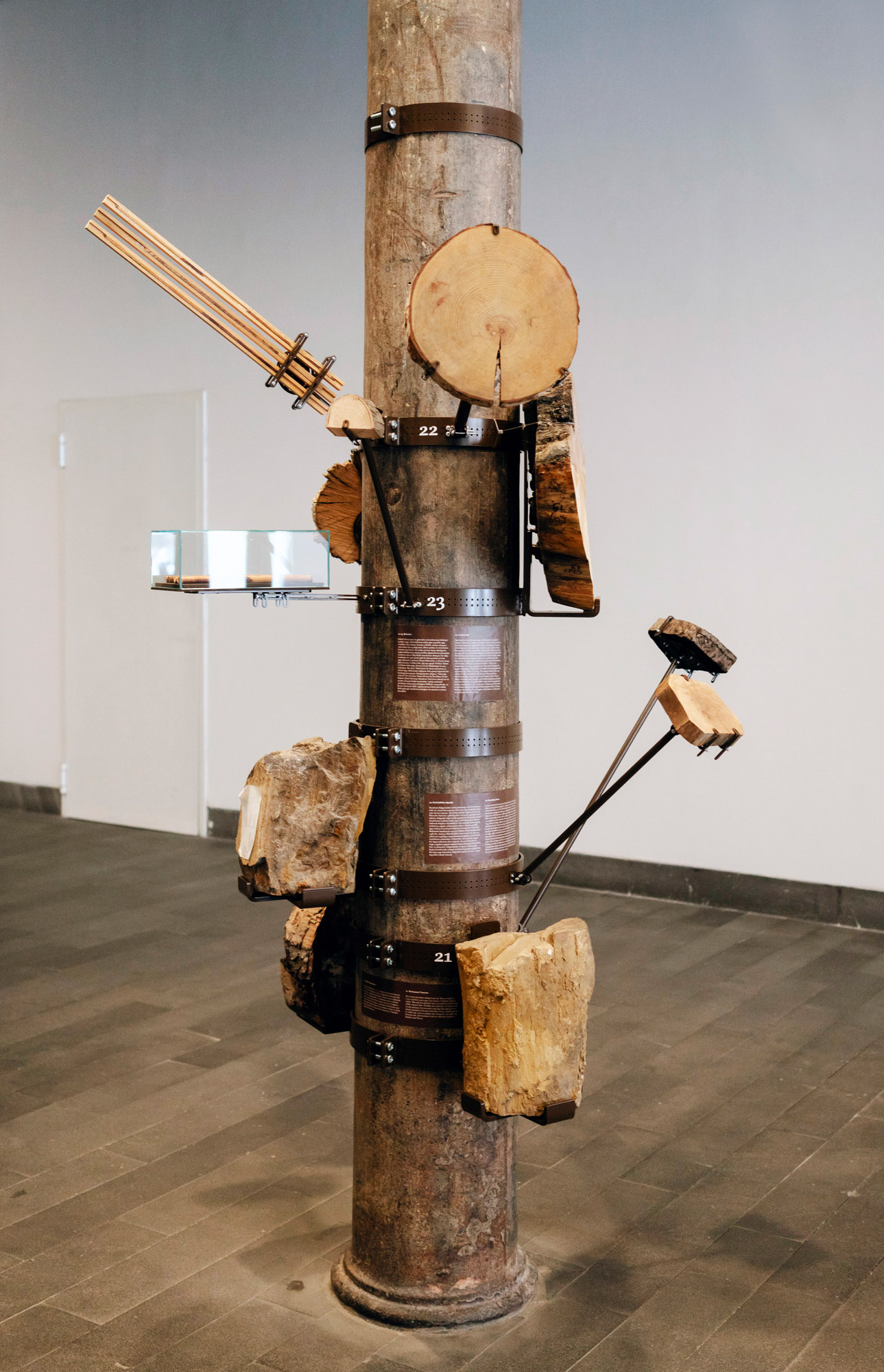
Weathered (2021), one of five commissioned works for Cooking Sections' exhibition 'Climavore: Seasons Made to Drift', at Istanbul's Salt Beyoğlu. The artists gathered a 'prosthetic forest' of material records relating to historic droughts and famines in Anatolia, to suggest climate patterns in the area before meteorological records are available.
The pair are currently showing at Salt Beyoğlu in Istanbul, an organisation that bridges contemporary art and design with research, exploring how the climate emergency is shifting productive regions for food and agriculture in Turkey and tackling the role of food in the fertility crisis (globally, men’s fertility rates are falling 1.4 per cent on average every year), an issue that they explain is closely connected with our culture of food. ‘The more the soil has been made fertile through agrochemicals, insecticides, herbicides, pesticides, you name it, over the 20th century, the more infertile humans have become because of the absorption of these substances that flow into rivers and seas,’ Schwabe explains.
It is impossible not to wonder what the role of governments is in a food industry centred around mass production, minimising costs at the expense of the wellbeing of animals and the safety of the food we consume. Is a Climavore diet a realistic way to tackle what is a systemic problem? ‘Yes. But for us, it’s not so much about the kind of decisions people are making as individuals,’ says Schwabe. ‘I think it’s one of the biggest problems of the food industry – that the responsibility and ethics of consumption has been flipped onto the consumer, whereas it should be the responsibility of governments, producers and market distributors.’
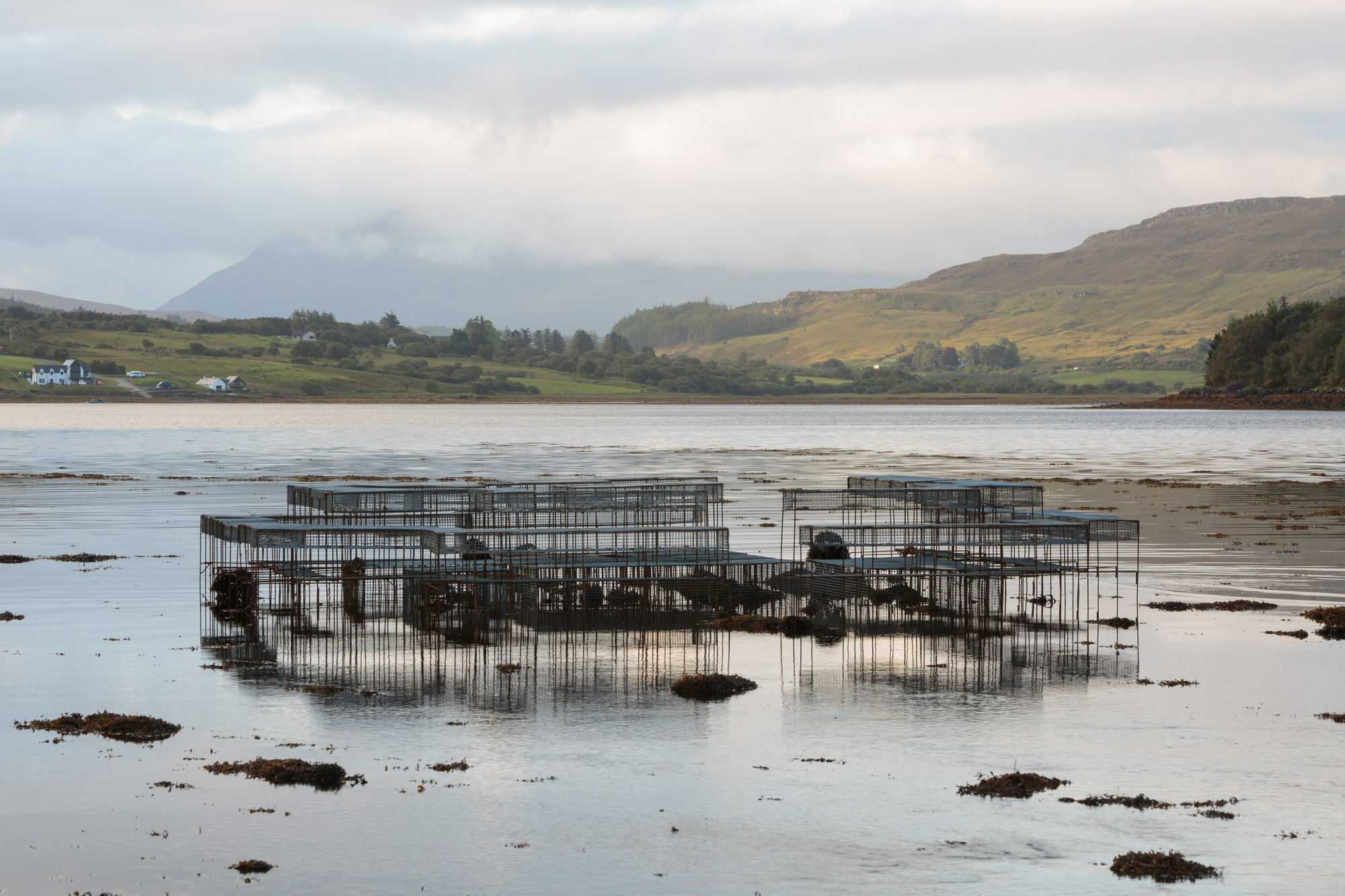
‘Climavore: On Tidal Zones’ highlights the effects of intensive salmon aquaculture on the Isle of Skye with an installation that works as an underwater oyster table at high tide and a dining table for humans at low tide. courtesy of Atlas Arts
Cooking Sections aspires to ask questions, change existing food systems, and respond to the local context in which it works through collaboration. The Turner Prize, which will be presented at the Herbert Art Gallery in Coventry this September, is bound to amplify the duo’s ideas, but hopefully will not subsume their work into the art world machine. To my mind, their interdisciplinary approach, drawing on their design background as a lens through which to explore structural issues, is what will enable their work to hold its own. If, as a post-industrial modern society, we’ve been obsessed with how to harness foods, objects and materials as consumable goods, then today it is increasingly up to designers to undo those structures of consumption and find an ethical and safe way out.
Receive our daily digest of inspiration, escapism and design stories from around the world direct to your inbox.
INFORMATION
‘Salmon: A Red Herring’ is showing until 31 August at Tate Britain, London, tate.org.uk
‘Climavore: Seasons Made to Drift’ is showing until 22 August at Salt Beyoğlu, Istanbul, saltonline.org
Turner Prize 2021 is showing 1 October - 10 January at Herbert Art Gallery & Museum, Coventry, theherbert.org